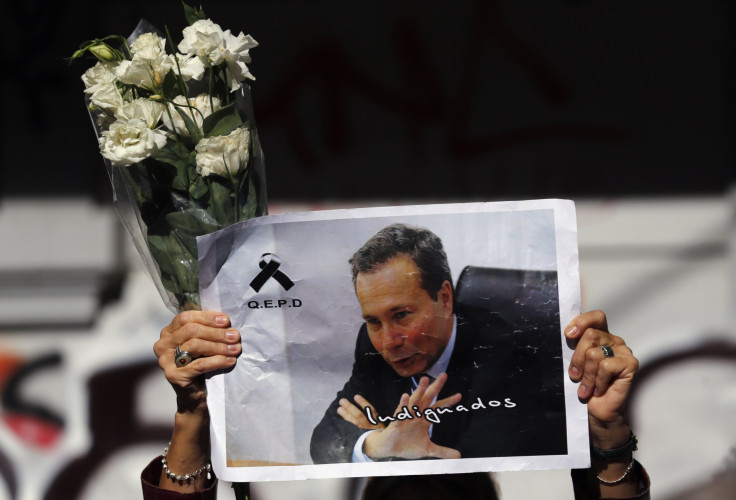Alberto Nisman Death: Argentine Official Slams Marco Rubio's Call For Independent Investigation

Argentina’s high-profile mystery over the death of a federal prosecutor has taken a series of twists in recent weeks, with each new detail adding more confusion to the puzzle. The case has sparked domestic political turmoil and international intrigue -- and now U.S. lawmakers are joining the game.
A senior Argentine government official on Friday retaliated against a suggestion made by U.S. Sen. Marco Rubio, R-Fla., that the U.S. should support an independent, international investigation into the death of Alberto Nisman, an Argentine prosecutor who was found dead in his apartment on Jan. 18. Nisman’s death came just one day before he was due to present formal allegations against President Cristina Fernández de Kirchner for what he said was a government cover-up of Iran’s involvement in a 1994 bombing of a Jewish community center.
“The stakes of the case and its implications extend well beyond Argentina and involve the international community and, more importantly, U.S. national security,” Rubio wrote in a letter to U.S. Secretary of State John Kerry Thursday. According to Nisman’s investigation, he added, the tactics allegedly used by Iranian intelligence agents in the 1994 bombing case were “previously reported as being used inside the United States by Iran.”
“As you intensify discussions with the Iranian regime, including with some officials whose names have surfaced in Mr. Nisman’s work, it is more important than ever for the American public and lawmakers to clearly understand the nature of Iran’s activities in our own hemisphere, now as well as in the past,” Rubio wrote.
“We do not accept interference from any country,” Jorge Capitanich, the cabinet chief of Argentina’s federal government, said Friday, according to local reports. Capitanich accused Sen. Rubio of meddling in sovereign affairs and described his remarks as part of an “imperialist vision,” adding that the senator “represents the most recalcitrant of the right.”
But Sen. Rubio has not been the only U.S. lawmaker to call for an independent investigation. U.S. Rep. Ed Royce, R-Calif., chair of the House Foreign Relations Committee, and U.S. Sen. Robert Menendez, D-N.J., ranking member of the Senate Foreign Relations Committee, have both spoken out about Argentina’s case. Sen. Menendez issued a statement last week calling for U.S. support for an “open and credible investigation,” while Rep. Royce also sent a letter to Secretary Kerry to assign an “independent, international panel to examine Nisman’s evidence.”
Those calls echo editorials published in the New York Times and the Washington Post last week that also advocated for an independent and transparent probe into Nisman’s abrupt death. But the voices aren’t coming from the U.S. alone -- in Chile, lawmakers have also pressed the foreign ministry to support an international investigation. But Chilean Foreign Minister Heraldo Muñoz said last week that Chile would not ask for one, saying the government would respect Argentina’s own judicial efforts.
Back in Argentina, the case has widened a rift between the government and Jewish groups, who boycotted the national Holocaust remembrance ceremony last week. Iranian Foreign Minister Mohammad Javad Zarif, meanwhile, maintained Iran’s longtime stance that the country had nothing to do with the 1994 bombing.
Nisman was due to present a judge with nearly 300 pages of evidence alleging collusion between Argentina and Iran in covering up Iranian involvement in the 1994 bombing. According to his findings, based on wiretaps of conversations between high-level Argentine and Iranian officials, a 2013 memorandum of understanding between the two countries served as a façade for a secret bilateral agreement for Argentina to purchase Iranian oil in exchange for grains exports and immunity for the Iranians accused of orchestrating the attack.
On Jan. 18, the day before his scheduled meeting with the judge, Nisman was found dead in his apartment with a .22-caliber gun and shell casing by his side. Initially, President Fernández supported early theories that Nisman may have committed suicide, but later backtracked, saying she did not think he killed himself and that he may have been an unwitting part of a larger conspiracy to destabilize the federal government. The case has also highlighted tensions between the president and the national intelligence agency, which President Fernández announced this week would be dissolved to make way for a new, more transparent body.
The president also cast suspicion on veteran intelligence agent Antonio Stiuso, who had been working with Nisman for the investigation, as well as Nisman’s friend, Diego Lagomarsino, who had lent Nisman the gun found beside his body. Lagomarsino has said Nisman approached him about borrowing the gun, expressing fear that he could not trust his bodyguards.
Federal Judge Ariel Lijo, who received Nisman’s official complaints against President Fernández and other Argentine political figures, is expected to issue a decision in February on whether the court will take up the case based on Nisman’s findings.
© Copyright IBTimes 2024. All rights reserved.






















